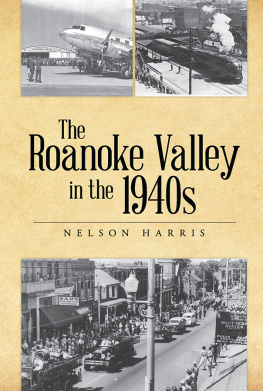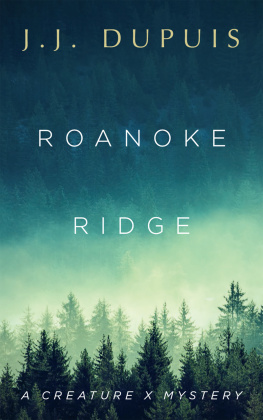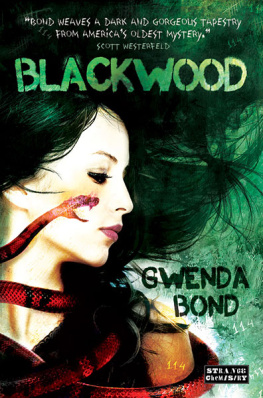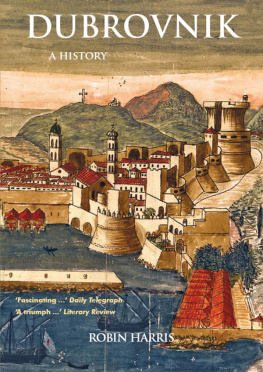Published by The History Press
Charleston, SC 29403
www.historypress.net
Copyright 2013 by Nelson Harris
All rights reserved
Front cover courtesy of the City of Roanoke.
First published 2013
e-book edition 2013
Manufactured in the United States
ISBN 978.1.62584.063.9
Library of Congress Cataloging-in-Publication Data
Harris, Nelson.
Hidden history of Roanoke : star city stories / Nelson Harris.
pages cm. -- (Hidden history)
print edition ISBN 978-1-60949-993-8 (pbk.)
1. Roanoke (Va.)--History--Anecdotes. I. Title.
F232.R6H37 2013
975.5791--dc23
2013027709
Notice: The information in this book is true and complete to the best of our knowledge. It is offered without guarantee on the part of the author or The History Press. The author and The History Press disclaim all liability in connection with the use of this book.
All rights reserved. No part of this book may be reproduced or transmitted in any form whatsoever without prior written permission from the publisher except in the case of brief quotations embodied in critical articles and reviews.
PREFACE
The metropolis provides what could otherwise only be gained by traveling; namely, the strange, so penned Jane Jacobs. Welcome to Roanokes hidden history or the strange of our Star City!
This collection of the sensational, curious, odd, tragic and heroic seeks to offer what is overlooked or forgotten in our more formal local histories; yet they are events that captured the imaginations and attention of Roanokers at the time of their occurrence. In some ways, they are a reflection of my own musings about what life was like in my hometown. I have often wondered, for example, what happened in Roanoke the night before Prohibition. Or the tales of mischief and, in one case, murder about which I have heard older Roanokers speak, as if sharing something that happened only last week. There were the wild days of Roanokes early years, when police were few and scandals numerous. There were events national in scope that had an impact on Roanoke, such as the flu pandemic of 1918 or Negro League baseball. The details of these Star City stories have been harvested from interviews and archival newspapers in an effort to use primary sources whenever possible.
This eclectic compilation of narratives is not produced solely to entertain or enlighten but to remind us that Roanokes story is a very human one, and as such, we find the multifaceted elements of our nature. The murder of a Jefferson High School student gripped our city in the summer of 1949 and stole the innocence of the sock-hop days. One of our citys best-known businesses was birthed from dealings that at best were shady and at worst, outright illegal. On hot summer nights, men swung a bat and chased fly balls in an era when the color of their skin prevented them from hoping to play professionally. Young women from all across the country refined themselves under the care of matrons at a college in South Roanoke whose buildings contained deep, long porches and parlors, while at the same time, and across town, the children of Norwich toiled at spinning cotton. The stories are as varied as the people contained in them.
I am indebted to the resources, collection and wonderful staff of the Roanoke Main Librarys Virginia Room and the reservoir of information contained there without which this book would not have been possible. I also wish to express my appreciation to Melinda Mayo, with the City of Roanoke, for her assistance.
Chapter 1
THE VAGABONDS
They started in Pittsburgh in the summer of 1918 and moved south with no real itinerary except to eventually reach Asheville, North Carolina. The four vagabonds planned to take two-lane roads, avoid hotels and camp roadside.
They wanted to see the mountains and relax. They pitched tents, cooked outdoors and reminisced. They stopped at abandoned gristmills and along rivers and rested in pastures. They cared little for encounters with others, though they were friendly if their presence was noticed. They were older and found pleasure in the simple companionship of close friends. Vagabond was not meant as a derogatory term by any means, for thats what they called themselves.
As they traveled through the Blue Ridge Mountains, they passed Bluefield, Elkins, Hot Springs, White Sulphur Springs, Narrows and, eventually, Asheville. An occasional photograph was taken, usually by residents of these communities who were curious about the vagabonds presence. As they began their return to Pittsburgh, the men journeyed to Winston-Salem and then north through Martinsville and Franklin County.
About noon on August 30, the vagabonds slipped quietly into Roanoke. Mrs. Fred Foster was managing the Hotel Roanoke, having taken over the role from her husband, who had died three years earlier, and Ed Brown was the headwaiter when the vagabonds stopped to have lunch. They did not look like vagabonds, as each was attired in suit and tie. They were unannounced, their lunch at the hotel necessitated by the lack of gasoline for their cars. They had stopped at the corner of Jefferson Street and Shenandoah Avenue in front of the Red Cross canteen station and sent for fuel. The hotel, being close, was convenient. Foster and Brown, like others at the hotel that afternoon, were struck as they watched the four vagabondsHenry Ford, Thomas Edison, tire magnate Harvey Firestone and naturalist John Burroughswalk through the lobby doors.
They were served lunch and shown hospitality. Henry Ford was fashionably thin in his three-piece suit, graying hair parted neatly to the side. Edison sported a bit of a paunch and a bow tie, with hair looking anything but combed. Burroughs was the eldest, at eighty, and his bushy white beard hung below the knot of his necktie, while Firestone wore travel clothes.
As the men dined, Roanokers could not help but notice the vagabonds parked caravan of two brand-new Fords and a large Packard. There were also two specially equipped Model T trucks that carried each mans ten-foot-square tent, a twenty-foot-square dining tent, a nine-foot dining table with lazy Susan, water tanks, stoves, an Edison-arranged refrigeration system for provisions and a small, portable electric contraption that lighted Edisons lamps strung each evening at their campsite. The caravan also included a chauffeur and cooks. By the time the men had consumed lunch and walked down the front steps of the Hotel Roanoke, a small crowd had formed as word was circulating of the vagabonds arrival.
As they awaited the supply of gasoline, the crowd became more numerous and was soon being engaged by the gregarious Ford, described as all energy, who shared stories, laughs and explained the groups travel. One citizen, Robert Wilson, asked Ford about bringing an automobile plant to Roanoke. Ford, whose business interests had broadened beyond automobiles, replied, Oh! You have a fine enough country down here for anything, but just now I am talking tractors and water power. The industrialist commented that the resource of water and its commercial potential is what had caught his attention driving through southwestern Virginia. Ford offered impressions on road conditions, especially between Martinsville and Roanoke, and punctuated all of his remarks with good humor. Ford even joked about his U.S. Senate candidacy, which was ongoing in Michigan. He had been rejected by the Republicans and so was running as a Democrat (an election he would narrowly lose).









